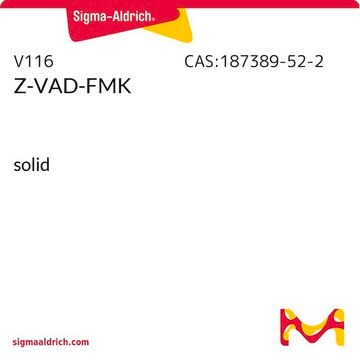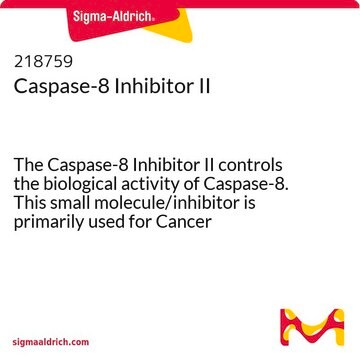264155
Caspase-3 Inhibitor II
The Caspase-3 Inhibitor II, also referenced under CAS 210344-95-9, controls the biological activity of Caspase-3. This small molecule/inhibitor is primarily used for Cancer applications.
Sinónimos:
Caspase-3 Inhibitor II, Z-D(OMe)E(Ome)VD(OMe)-FMK
About This Item
Productos recomendados
Quality Level
assay
≥90% (TLC)
form
solid
manufacturer/tradename
Calbiochem®
storage condition
OK to freeze
desiccated
color
white to slightly brown
solubility
DMSO: 5 mg/mL
shipped in
ambient
storage temp.
−20°C
SMILES string
FCC(=O)[C@@H](NC(=O)[C@@H](NC(=O)[C@@H](NC(=O)[C@@H](NC(=O)OCc1ccccc1)CC(=O)OC)CCC(=O)OC)C(C)C)CC(=O)OC
InChI
1S/C30H41FN4O12/c1-17(2)26(29(42)33-20(22(36)15-31)13-24(38)45-4)35-27(40)19(11-12-23(37)44-3)32-28(41)21(14-25(39)46-5)34-30(43)47-16-18-9-7-6-8-10-18/h6-10,17,19-21,26H,11-16H2,1-5H3,(H,32,41)(H,33,42)(H,34,43)(H,35,40)/t19-,20-,21-,26-/m0/s1
InChI key
GBJVAVGBSGRRKN-JYEBCORGSA-N
General description
Biochem/physiol Actions
caspase-3, caspase-6, caspase-7, caspase-8, caspase-10
Warning
Sequence
Reconstitution
Other Notes
Masuda, Y., et al. 1997. Biochem. Biophys. Res. Commun. 234, 641.
Nicholson, D.W. 1996. Nature Biotech. 14, 297.
Schlegel, J., et al. 1996. J. Biol. Chem. 271, 1841.
Nicholson, D.W., et al. 1995. Nature 376, 37.
Legal Information
Storage Class
11 - Combustible Solids
wgk_germany
WGK 1
flash_point_f
Not applicable
flash_point_c
Not applicable
Certificados de análisis (COA)
Busque Certificados de análisis (COA) introduciendo el número de lote del producto. Los números de lote se encuentran en la etiqueta del producto después de las palabras «Lot» o «Batch»
¿Ya tiene este producto?
Encuentre la documentación para los productos que ha comprado recientemente en la Biblioteca de documentos.
Los clientes también vieron
Nuestro equipo de científicos tiene experiencia en todas las áreas de investigación: Ciencias de la vida, Ciencia de los materiales, Síntesis química, Cromatografía, Analítica y muchas otras.
Póngase en contacto con el Servicio técnico












